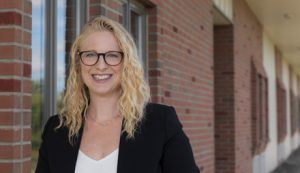 A year-long pilot program investigating how parent-child interactions impact what preschool children learn and remember about STEM processing skills will move into a formal two-year research project this fall, thanks to a grant of nearly $300,000 from the National Science Foundation.
A year-long pilot program investigating how parent-child interactions impact what preschool children learn and remember about STEM processing skills will move into a formal two-year research project this fall, thanks to a grant of nearly $300,000 from the National Science Foundation.
School readiness scores show boys outperforming girls in STEM (science, technology, engineering and mathematics) subjects. “If we look at boosting rich conversation with open-ended questions and associations related to STEM, that might help drive equality,” says Erin Jant, a visiting assistant professor of psychology at Binghamton University. She will continue her collaboration with the Sciencenter in Ithaca, N.Y. this fall, and start her research this spring at the Maryland Science Center in Baltimore.
The Sciencenter holds private, monthly family engagement nights for caregivers and 3- to 5-year-olds enrolled in Head Start, a U.S. Department of Health and Human Services program that promotes school readiness for kids ages 5 and under from low-income families.
“We’ve been working with Head Start for a long time, and we knew that children were successfully learning about science,” Sciencenter Executive Director Michelle Kortenaar says. “We wanted to create a national model but we needed to prove it. I knew of Erin and her research in how children learn, so I was super excited when she reached out to us shortly after she moved to the area. She’s as interested in our questions as she is in her own research questions.”
With 1,700 agencies in communities across the nation providing Head Start services to more than a million children every year, Jant’s research could have a significant impact.
Sciencenter’s Head Start event includes hands-on activities, such as manipulating weights, comparing sizes, measuring tools or working with magnets. “It allows the children to explore and build those science process skills, but the conversations they have with their caregiver are so important,” Jant says. “We’ve seen how the type of conversation can change how much is remembered from the experience.”
The families participating in Jant’s research will be assigned at random to one of four groups:
- baseline or the control group (families aren’t given any prompts and are just observed)
- elaborative (caregivers are given prompts to ask open-ended questions like “How do you think we should start?”)
- association (caregivers are given prompts to ask questions like “How is this like the magnets on the refrigerator at home?”)
- combination (caregivers are encouraged to ask both elaborative and association questions)
Families will be recorded as they are playing and interacting with the hands-on activities. Two weeks later, they’ll record a conversation at home as children independently participate in a specially constructed problem-solving task.
“We’re looking at whether the parents are still using conversational prompts they were given and what the child’s memories are,” Jant says. “Are they making those connections from the special activities during the problem-solving task? Which aspects of the museum interactions are critical for learning and remembering?”
Both science centers will follow the same model, allowing Jant to study rural versus urban settings and populations. “We want to look at the interactions across the two spaces and learn what pieces of this program are critical to the space,” she says. “How much of the whole space is being explored? Is it better to keep the hands-on science activities just to first-floor level activities, or does that not matter for engagement?”
Since the start of the pilot, Jant has relied on a team of 12 students from her lab to carry out data collection and to code audio and videotapes. “They are the driving force for this project’s success for sure,” she says, adding that she hopes to connect with Baltimore-area university students interested in research to assist her in the spring. “I think it would create a unique collaboration for my students as well. We could have joint lab meetings and it would expand their network.”







